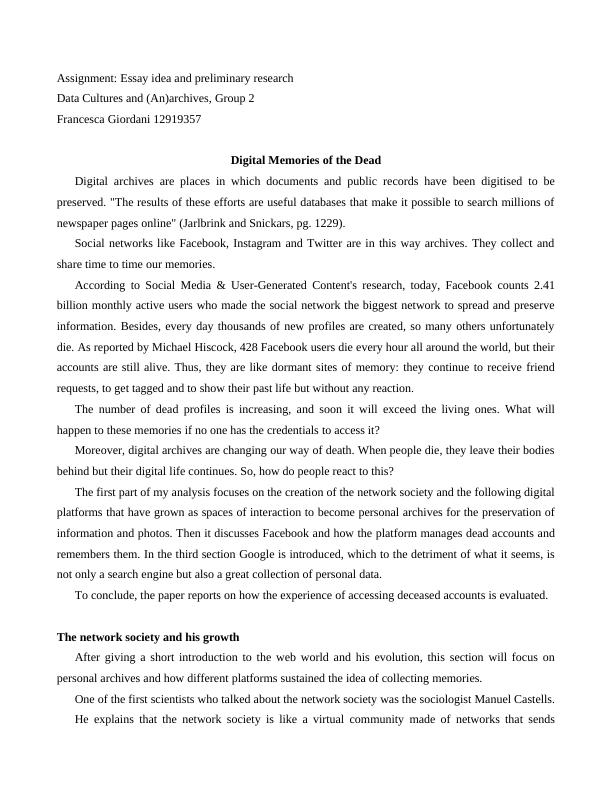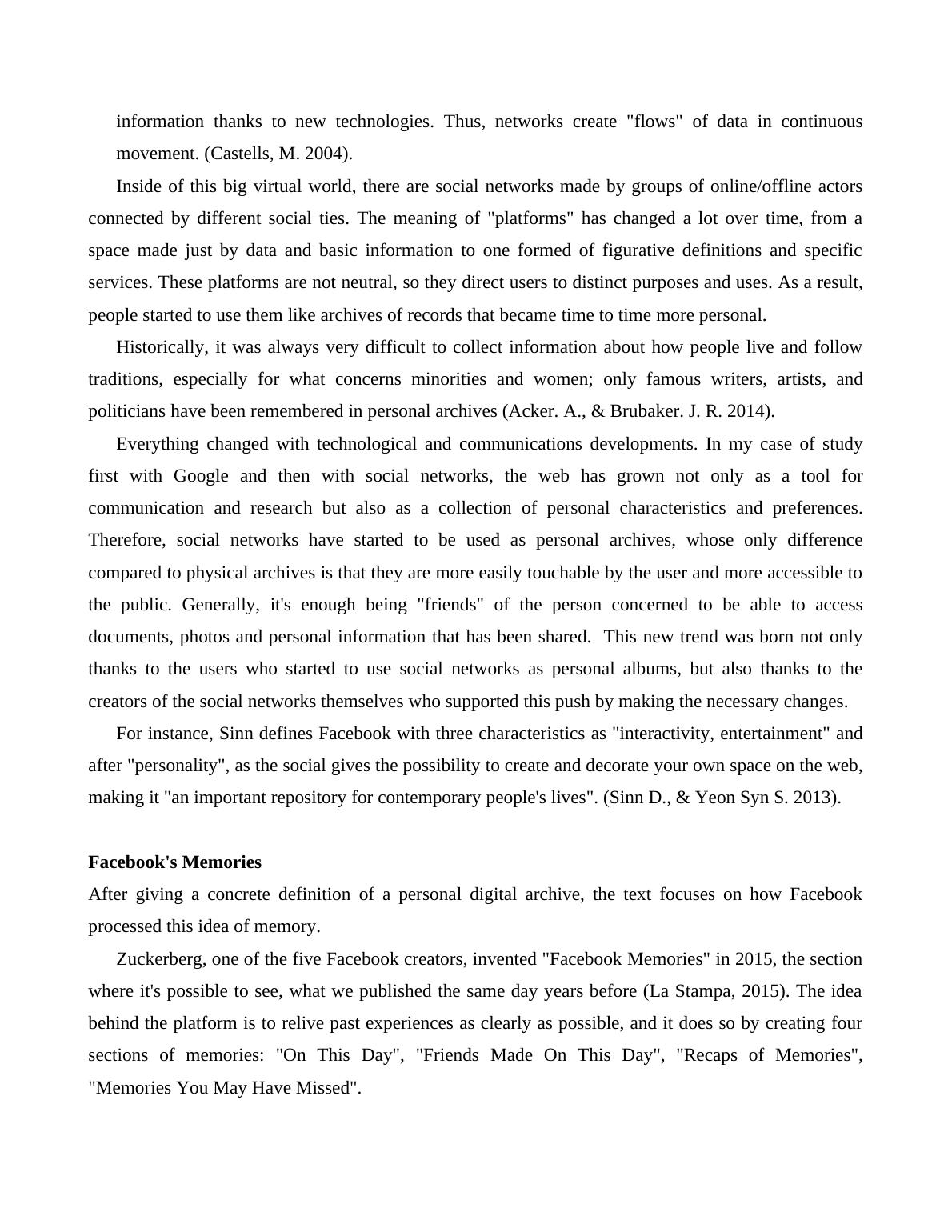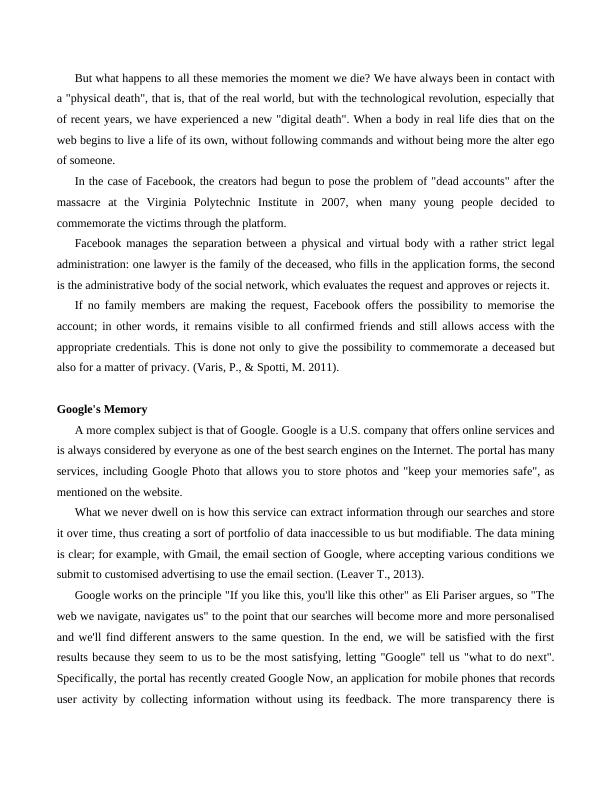Assignment: Digital Memories of the Dead
Added on 2022-09-11
7 Pages2809 Words11 Views
Assignment: Essay idea and preliminary research
Data Cultures and (An)archives, Group 2
Francesca Giordani 12919357
Digital Memories of the Dead
Digital archives are places in which documents and public records have been digitised to be
preserved. "The results of these efforts are useful databases that make it possible to search millions of
newspaper pages online" (Jarlbrink and Snickars, pg. 1229).
Social networks like Facebook, Instagram and Twitter are in this way archives. They collect and
share time to time our memories.
According to Social Media & User-Generated Content's research, today, Facebook counts 2.41
billion monthly active users who made the social network the biggest network to spread and preserve
information. Besides, every day thousands of new profiles are created, so many others unfortunately
die. As reported by Michael Hiscock, 428 Facebook users die every hour all around the world, but their
accounts are still alive. Thus, they are like dormant sites of memory: they continue to receive friend
requests, to get tagged and to show their past life but without any reaction.
The number of dead profiles is increasing, and soon it will exceed the living ones. What will
happen to these memories if no one has the credentials to access it?
Moreover, digital archives are changing our way of death. When people die, they leave their bodies
behind but their digital life continues. So, how do people react to this?
The first part of my analysis focuses on the creation of the network society and the following digital
platforms that have grown as spaces of interaction to become personal archives for the preservation of
information and photos. Then it discusses Facebook and how the platform manages dead accounts and
remembers them. In the third section Google is introduced, which to the detriment of what it seems, is
not only a search engine but also a great collection of personal data.
To conclude, the paper reports on how the experience of accessing deceased accounts is evaluated.
The network society and his growth
After giving a short introduction to the web world and his evolution, this section will focus on
personal archives and how different platforms sustained the idea of collecting memories.
One of the first scientists who talked about the network society was the sociologist Manuel Castells.
He explains that the network society is like a virtual community made of networks that sends
Data Cultures and (An)archives, Group 2
Francesca Giordani 12919357
Digital Memories of the Dead
Digital archives are places in which documents and public records have been digitised to be
preserved. "The results of these efforts are useful databases that make it possible to search millions of
newspaper pages online" (Jarlbrink and Snickars, pg. 1229).
Social networks like Facebook, Instagram and Twitter are in this way archives. They collect and
share time to time our memories.
According to Social Media & User-Generated Content's research, today, Facebook counts 2.41
billion monthly active users who made the social network the biggest network to spread and preserve
information. Besides, every day thousands of new profiles are created, so many others unfortunately
die. As reported by Michael Hiscock, 428 Facebook users die every hour all around the world, but their
accounts are still alive. Thus, they are like dormant sites of memory: they continue to receive friend
requests, to get tagged and to show their past life but without any reaction.
The number of dead profiles is increasing, and soon it will exceed the living ones. What will
happen to these memories if no one has the credentials to access it?
Moreover, digital archives are changing our way of death. When people die, they leave their bodies
behind but their digital life continues. So, how do people react to this?
The first part of my analysis focuses on the creation of the network society and the following digital
platforms that have grown as spaces of interaction to become personal archives for the preservation of
information and photos. Then it discusses Facebook and how the platform manages dead accounts and
remembers them. In the third section Google is introduced, which to the detriment of what it seems, is
not only a search engine but also a great collection of personal data.
To conclude, the paper reports on how the experience of accessing deceased accounts is evaluated.
The network society and his growth
After giving a short introduction to the web world and his evolution, this section will focus on
personal archives and how different platforms sustained the idea of collecting memories.
One of the first scientists who talked about the network society was the sociologist Manuel Castells.
He explains that the network society is like a virtual community made of networks that sends

information thanks to new technologies. Thus, networks create "flows" of data in continuous
movement. (Castells, M. 2004).
Inside of this big virtual world, there are social networks made by groups of online/offline actors
connected by different social ties. The meaning of "platforms" has changed a lot over time, from a
space made just by data and basic information to one formed of figurative definitions and specific
services. These platforms are not neutral, so they direct users to distinct purposes and uses. As a result,
people started to use them like archives of records that became time to time more personal.
Historically, it was always very difficult to collect information about how people live and follow
traditions, especially for what concerns minorities and women; only famous writers, artists, and
politicians have been remembered in personal archives (Acker. A., & Brubaker. J. R. 2014).
Everything changed with technological and communications developments. In my case of study
first with Google and then with social networks, the web has grown not only as a tool for
communication and research but also as a collection of personal characteristics and preferences.
Therefore, social networks have started to be used as personal archives, whose only difference
compared to physical archives is that they are more easily touchable by the user and more accessible to
the public. Generally, it's enough being "friends" of the person concerned to be able to access
documents, photos and personal information that has been shared. This new trend was born not only
thanks to the users who started to use social networks as personal albums, but also thanks to the
creators of the social networks themselves who supported this push by making the necessary changes.
For instance, Sinn defines Facebook with three characteristics as "interactivity, entertainment" and
after "personality", as the social gives the possibility to create and decorate your own space on the web,
making it "an important repository for contemporary people's lives". (Sinn D., & Yeon Syn S. 2013).
Facebook's Memories
After giving a concrete definition of a personal digital archive, the text focuses on how Facebook
processed this idea of memory.
Zuckerberg, one of the five Facebook creators, invented "Facebook Memories" in 2015, the section
where it's possible to see, what we published the same day years before (La Stampa, 2015). The idea
behind the platform is to relive past experiences as clearly as possible, and it does so by creating four
sections of memories: "On This Day", "Friends Made On This Day", "Recaps of Memories",
"Memories You May Have Missed".
movement. (Castells, M. 2004).
Inside of this big virtual world, there are social networks made by groups of online/offline actors
connected by different social ties. The meaning of "platforms" has changed a lot over time, from a
space made just by data and basic information to one formed of figurative definitions and specific
services. These platforms are not neutral, so they direct users to distinct purposes and uses. As a result,
people started to use them like archives of records that became time to time more personal.
Historically, it was always very difficult to collect information about how people live and follow
traditions, especially for what concerns minorities and women; only famous writers, artists, and
politicians have been remembered in personal archives (Acker. A., & Brubaker. J. R. 2014).
Everything changed with technological and communications developments. In my case of study
first with Google and then with social networks, the web has grown not only as a tool for
communication and research but also as a collection of personal characteristics and preferences.
Therefore, social networks have started to be used as personal archives, whose only difference
compared to physical archives is that they are more easily touchable by the user and more accessible to
the public. Generally, it's enough being "friends" of the person concerned to be able to access
documents, photos and personal information that has been shared. This new trend was born not only
thanks to the users who started to use social networks as personal albums, but also thanks to the
creators of the social networks themselves who supported this push by making the necessary changes.
For instance, Sinn defines Facebook with three characteristics as "interactivity, entertainment" and
after "personality", as the social gives the possibility to create and decorate your own space on the web,
making it "an important repository for contemporary people's lives". (Sinn D., & Yeon Syn S. 2013).
Facebook's Memories
After giving a concrete definition of a personal digital archive, the text focuses on how Facebook
processed this idea of memory.
Zuckerberg, one of the five Facebook creators, invented "Facebook Memories" in 2015, the section
where it's possible to see, what we published the same day years before (La Stampa, 2015). The idea
behind the platform is to relive past experiences as clearly as possible, and it does so by creating four
sections of memories: "On This Day", "Friends Made On This Day", "Recaps of Memories",
"Memories You May Have Missed".

But what happens to all these memories the moment we die? We have always been in contact with
a "physical death", that is, that of the real world, but with the technological revolution, especially that
of recent years, we have experienced a new "digital death". When a body in real life dies that on the
web begins to live a life of its own, without following commands and without being more the alter ego
of someone.
In the case of Facebook, the creators had begun to pose the problem of "dead accounts" after the
massacre at the Virginia Polytechnic Institute in 2007, when many young people decided to
commemorate the victims through the platform.
Facebook manages the separation between a physical and virtual body with a rather strict legal
administration: one lawyer is the family of the deceased, who fills in the application forms, the second
is the administrative body of the social network, which evaluates the request and approves or rejects it.
If no family members are making the request, Facebook offers the possibility to memorise the
account; in other words, it remains visible to all confirmed friends and still allows access with the
appropriate credentials. This is done not only to give the possibility to commemorate a deceased but
also for a matter of privacy. (Varis, P., & Spotti, M. 2011).
Google's Memory
A more complex subject is that of Google. Google is a U.S. company that offers online services and
is always considered by everyone as one of the best search engines on the Internet. The portal has many
services, including Google Photo that allows you to store photos and "keep your memories safe", as
mentioned on the website.
What we never dwell on is how this service can extract information through our searches and store
it over time, thus creating a sort of portfolio of data inaccessible to us but modifiable. The data mining
is clear; for example, with Gmail, the email section of Google, where accepting various conditions we
submit to customised advertising to use the email section. (Leaver T., 2013).
Google works on the principle "If you like this, you'll like this other" as Eli Pariser argues, so "The
web we navigate, navigates us" to the point that our searches will become more and more personalised
and we'll find different answers to the same question. In the end, we will be satisfied with the first
results because they seem to us to be the most satisfying, letting "Google" tell us "what to do next".
Specifically, the portal has recently created Google Now, an application for mobile phones that records
user activity by collecting information without using its feedback. The more transparency there is
a "physical death", that is, that of the real world, but with the technological revolution, especially that
of recent years, we have experienced a new "digital death". When a body in real life dies that on the
web begins to live a life of its own, without following commands and without being more the alter ego
of someone.
In the case of Facebook, the creators had begun to pose the problem of "dead accounts" after the
massacre at the Virginia Polytechnic Institute in 2007, when many young people decided to
commemorate the victims through the platform.
Facebook manages the separation between a physical and virtual body with a rather strict legal
administration: one lawyer is the family of the deceased, who fills in the application forms, the second
is the administrative body of the social network, which evaluates the request and approves or rejects it.
If no family members are making the request, Facebook offers the possibility to memorise the
account; in other words, it remains visible to all confirmed friends and still allows access with the
appropriate credentials. This is done not only to give the possibility to commemorate a deceased but
also for a matter of privacy. (Varis, P., & Spotti, M. 2011).
Google's Memory
A more complex subject is that of Google. Google is a U.S. company that offers online services and
is always considered by everyone as one of the best search engines on the Internet. The portal has many
services, including Google Photo that allows you to store photos and "keep your memories safe", as
mentioned on the website.
What we never dwell on is how this service can extract information through our searches and store
it over time, thus creating a sort of portfolio of data inaccessible to us but modifiable. The data mining
is clear; for example, with Gmail, the email section of Google, where accepting various conditions we
submit to customised advertising to use the email section. (Leaver T., 2013).
Google works on the principle "If you like this, you'll like this other" as Eli Pariser argues, so "The
web we navigate, navigates us" to the point that our searches will become more and more personalised
and we'll find different answers to the same question. In the end, we will be satisfied with the first
results because they seem to us to be the most satisfying, letting "Google" tell us "what to do next".
Specifically, the portal has recently created Google Now, an application for mobile phones that records
user activity by collecting information without using its feedback. The more transparency there is

End of preview
Want to access all the pages? Upload your documents or become a member.
Related Documents
The Ethics of Dead People Online Abstractlg...
|12
|4578
|129
Applied Research Methods for Communicationlg...
|16
|4854
|374
Social media helps in different fields including careerlg...
|15
|644
|8
Analysis on Cambridge Analytica 2022lg...
|22
|4212
|12
Research On Reason for People Using Facebooklg...
|21
|4487
|59
Entrepreneurship in a Digital Agelg...
|6
|944
|241